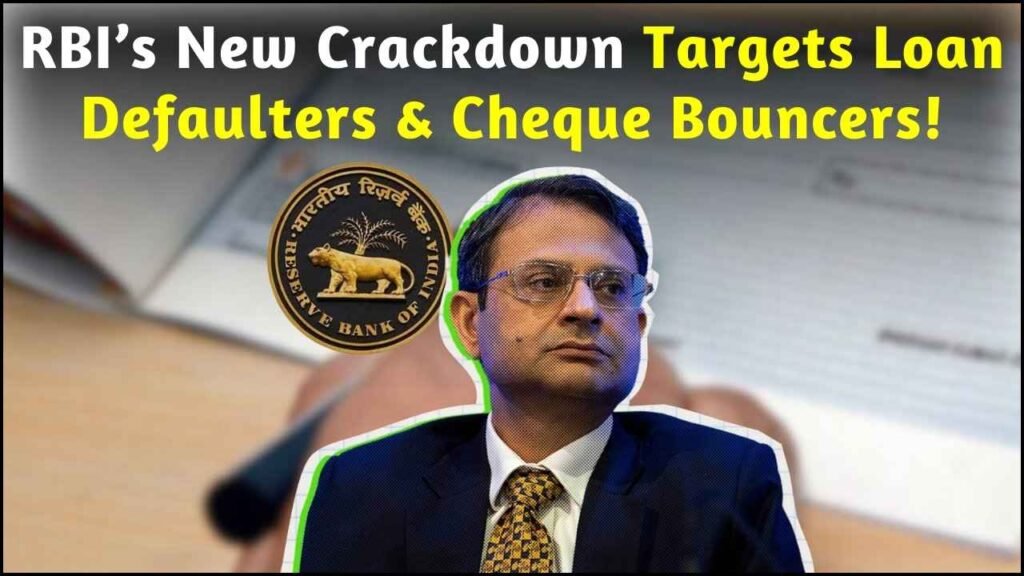
In a major step towards strengthening India’s financial system, the Reserve Bank of India (RBI) has rolled out strict new regulations to deal with loan defaulters and cheque bouncers. With increasing cases of bad loans and bounced cheques affecting the banking sector, the RBI’s latest crackdown aims to restore discipline, improve transparency, and reinforce trust among the public. These new measures come at a crucial time when India is striving to maintain financial stability.
What does the RBI’s New Crackdown Mean?
The RBI’s new policy sets tougher financial and legal consequences for those who default on loans or issue cheques without sufficient funds. Here’s a closer look at the changes:
- Borrowers who default repeatedly will now face more serious consequences, including a sharp drop in their credit ratings.
- Banks are required to report defaults much more aggressively and quickly.
- A centralized database will track major loan defaulters and cheque bouncers.
- Lenders must apply stricter checks before granting new loans or credit cards.
- Cheque bouncers could face not just legal action but also digital blacklisting, affecting their future financial dealings.
Who Will Feel the Impact?
The new rules are not limited to large corporations alone. Individuals, small businesses, and even salaried professionals are within the scope of this crackdown. Key groups likely to be affected include:
- Personal loan defaulters
- Credit card holders missing payments
- Small and Medium Enterprises (MSMEs) with bounced payments
- Real estate firms defaulting on loan installments
- Anyone issuing cheques without maintaining an adequate bank balance
Major Changes in Reporting Standards
Under the earlier system, banks often delayed reporting defaults or compiled them in monthly summaries. The RBI’s new framework demands faster, real-time reporting:
- Any loan default exceeding ₹50,000 must be reported within 7 days.
- Instances of cheque bouncing must be uploaded to a digital platform on the same day.
- Credit bureau databases will now be integrated for enhanced transparency.
- Borrowers will receive immediate digital notifications and reminders before facing penalties.
These steps aim to minimize bad loans by acting quickly and holding offenders accountable without delay.
Table: Key Compliance Changes Under the New RBI Rules
| Action | Previous Rule | New Rule | Reporting Timeline |
|---|---|---|---|
| Personal Loan Default Reporting | Monthly report | Real-time reporting | Within 7 days |
| Cheque Bounce Reporting | Discretionary | Mandatory for the RBI | Same day |
| Notifying Credit Bureaus | Delayed updates | Immediate notification | Within 3 days |
| Freezing Future Loans | Only high-value loans | After 2 offenses | Immediate |
| Blacklisting Threshold | ₹1 lakh+ | ₹50,000+ | Immediate listing |
| Legal Action Initiation | After several bank reminders | After 2 notices | Within 14 days |
| Online Portal Sync | Monthly | Daily | Every 24 hours |
Tougher Punishment for Cheque Bounce Cases
The RBI is coordinating with courts and state authorities to strengthen the enforcement of penalties under the Negotiable Instruments Act. The revised rules include:
- Repeat offenders could face up to 2 years’ imprisonment.
- A minimum fine of ₹10,000 for each bounced cheque.
- Companies found guilty of issuing bad cheques could lose eligibility for government contracts.
- Offenders may face digital blacklisting, affecting GST registrations, tax filings, and future loan applications.
Checklist of Penalties:
- Minimum ₹10,000 fine per cheque bounce
- Up to 2 years of imprisonment for repeat offenses
- Freezing of bank accounts
- Ineligibility for loans and credit cards for up to 3 years
- Name published in the RBI’s defaulter registry
Table: Penalties for Cheque Bounce vs Loan Default
| Offense Type | First Offense | Repeat Offense | Corporate Consequences |
|---|---|---|---|
| Cheque Bounce | Fine up to ₹5,000 | Jail + Fine ₹10,000+ | Disqualification from government contracts |
| Loan EMI Missed | Credit Score Damage | RBI Reporting + Blacklisting | 3-year loan ban |
| Post-dated Cheque Fail | Bank notice | Digital alert across banks | GST suspension, ROC reporting |
| Default > ₹50,000 | One-time warning | Immediate credit ban | SEBI/ROC monitoring |
Why RBI’s Action Matters?
The rise of Non-Performing Assets (NPAs) and the casual misuse of financial instruments like cheques have long been a concern. This crackdown is intended to:
- Protect genuine borrowers by isolating habitual defaulters.
- Restore confidence among investors in India’s banking sector.
- Encourage a culture of responsible borrowing and lending.
- Strengthen the overall health of the economy, especially in the MSME and retail sectors.
Banks, with faster reporting tools, will now have the power to act before defaults escalate into large non-recoverable debts.
How Borrowers Can Safeguard Themselves?
Borrowers must take active steps to ensure they stay compliant with the new rules. Here’s how:
- Always maintain a balance in your bank account to honor cheques.
- Set automated reminders for loan EMIs and cheque clearances.
- Monitor your credit score monthly.
- Respond promptly to any notices from your bank or financial institution.
- Avoid taking multiple loans that could stretch your repayment capacity.
Table: Safe Financial Practices to Avoid RBI Penalties
| Action | Benefit | Frequency |
|---|---|---|
| Maintaining cheque balance | Prevents bounce and legal trouble | Always before issuing a cheque |
| Paying EMI on time | Protects and improves credit score | Monthly |
| Using auto-debit facilities | Ensures payments are not missed | Highly recommended |
| Checking credit reports | Early detection of negative listings | Once a month |
| Responding to notices | Avoids escalation into legal action | Within 48 hours |
| Managing loan exposure | Reduces financial stress | Annually |
| Keeping digital transaction records | Useful for dispute resolution | Ongoing |
Final Words
The RBI’s new policies send a strong signal: there is no place for financial indiscipline in India’s banking system anymore. While the move may seem tough, it’s a progressive step towards creating a more transparent, trustworthy, and investor-friendly environment. By maintaining good financial habits, borrowers can easily stay on the right side of these new regulations and contribute to a healthier economic future.

Mangesh Garg is a passionate writer known for captivating stories that blend imagination and reality. Inspired by travel, history, and everyday moments, He crafts narratives that resonate deeply with readers



